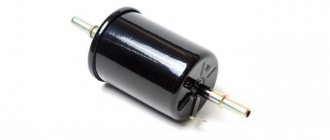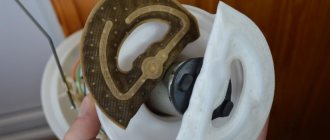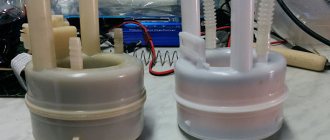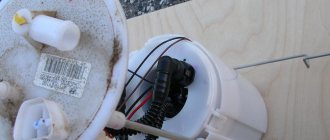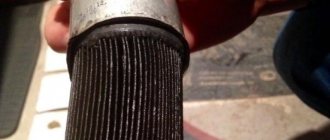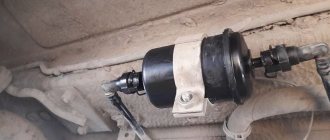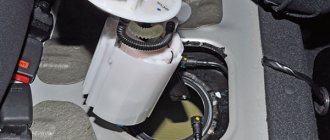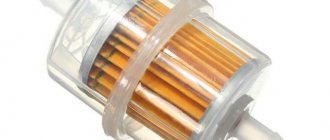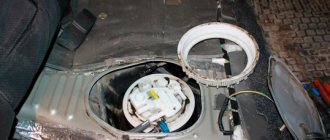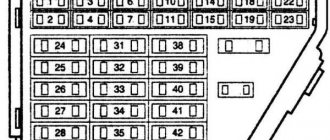Timely maintenance of automobile diesel engines is one of the conditions that ensures trouble-free operation of the vehicle. The frequency of oil and filter changes is reflected in the manufacturer's recommendations. Therefore, most car owners try to adhere to these proposals.
The fuel system of a car is the most sensitive to the quality properties and purity of the supplied fuel. Diesel fuel may contain a number of substances that clog fuel injection pumps and injectors. The only protective device against impurities contained in diesel fuel is a filter device.
However, if the recommendations are followed, problems may arise in the operation of the vehicle. In the instructions, manufacturers indicate the frequency intervals for replacing consumables, but the period time does not correspond to the actual service life of the materials. The recommendations do not take into account such aspects as the quality of fuels and lubricants, the condition of roads in different regions and other factors.
Therefore, motorists need to know how often the filter should be changed, based on actual operating conditions.
Features of the diesel fuel filter
Fuel filters are installed on both gasoline and diesel cars. But the requirements for filtration quality are higher in the case of a diesel engine, and the filter elements themselves are changed more often.
It's all about the design features of a diesel engine: the pressure under which diesel fuel is injected into the cylinders is much higher than in the case of a gasoline internal combustion engine. High pressure requires greater tightness, therefore, the gaps in the pumps and injectors that supply fuel to the combustion chamber must be minimal. And the particles that the fuel filter allows through must be smaller than the gap, otherwise the elements will wear out.
Hence such high requirements for the cleanliness of diesel fuel : condensate, sediment, foreign impurities, metal dust and shavings - all these are direct threats to the durability of diesel fuel equipment.
It should be taken into account that diesel fuel becomes contaminated from the very beginning of the process of its production and further during storage: oxidation occurs in it, suspensions appear, it becomes cloudy, mixes with condensate (water) from the walls of the tank, and in winter it thickens, forming a paraffin deposit.
- If the fuel is of questionable quality or an air lock has formed in the line, the parts of the fuel equipment are no longer lubricated by fuel, and metal dust, shavings, foreign impurities with large particles enter the fuel supply system, which clog the nozzles and injector needles, “wash out” the channels in the injector valves, irreversibly damage the fuel injection pump, accelerating the wear of expensive elements.
Water inevitably enters the fuel system as a result of condensation of water vapor; this occurs both at the gas station and in the car tank.
- If the filter does not separate water from the fuel, it gets on the elements and causes their corrosion, for example, on the fuel injection pump blades. And it can even get into the engine cylinders, causing detonation during fuel combustion.
Thus, effective cleaning of diesel fuel with a fuel filter directly affects the reliability and service life of the diesel engine.
Design and principle of operation of a diesel fuel filter
Fuel purification in the diesel power system takes place in several stages:
- First, the fuel enters the tank. Some of the large impurities precipitate and remain at the bottom of the tank, the other part is filtered out by a coarse mesh, which is installed at the outlet (sometimes at the inlet) of the fuel tank;
- then the diesel fuel enters the coarse filter, which, depending on the design of the car, can be located either inside the fuel tank, in a kind of glass, or on a section of the fuel line. The brass mesh of the coarse filter retains particles and fractions in diesel fuel ranging in size from 0.5 to 1 mm.
- After the coarse cleaning stage, diesel fuel passes through a fine filter. It is capable of trapping the smallest particles, and the size of the filter element cells determines how clean the fuel gets into the engine cylinders. The fine filter is installed on a section of the fuel line between the tank and the injection pump, or in the engine compartment.
On different car models and depending on the type of diesel fuel equipment, fuel filters have different designs and are also arranged differently.
The most popular device options:
- when the fuel filter is a single unit, where the coarse and fine filter elements are combined in one housing;
- when the coarse filter and the fine filter are two separate units;
- when the fuel filter is an integral part of other elements of the fuel system, mainly built into the fuel pump or connected to the fuel level sensor in the tank.
The ease of access to it and the ability to change the part yourself depend on the location and design features of the fuel filter.
The main difference between a fuel filter for a diesel engine and an analogue for a gasoline engine is that diesel filters have a special container where all the filtered moisture is collected, and this container must be cleaned periodically to prevent water from getting into the engine.
Also, heating elements are often installed in the diesel filter so that it does not freeze in cold weather and the engine can be started in winter without problems.
Filters for diesel engines are:
- collapsible, where only the filter element itself can be replaced, and the housing remains in place;
- non-separable, essentially disposable, where you have to change the filter along with the housing.
When is it time to change the fuel filter?
On most cars with a diesel engine, it is not possible to check the condition of the fuel filter, so they change it according to mileage data.
On average, the service life indicated by manufacturers is 15-40 thousand km, depending on the type of filter:
- for conventional external type filters (“barrels”) – up to 20-30 thousand km;
- for cartridge filters – from 60 to 120 thousand km.
The former are usually used on public sector cars, and the latter on premium cars from Japanese, Korean and American manufacturers.
It is better to carry out replacement work in the fall, before the onset of cold weather. The throughput capacity of the new filter will be higher, it will definitely be enough to pass fuel that thickens in the cold - which cannot be said about a filter that has been collecting impurities from diesel fuel for a season or two.
Outside of the regulations, it is necessary to change the filter if, after refueling the car, the engine begins to behave unusually (the sound of its operation has changed, the thrust has dropped, etc.) and the owner suspects that foreign impurities have entered the tank. Moreover, just replacing the filter will not do the job: you need to drain the suspicious fuel as quickly as possible and replace it with proven fuel - and in some cases, you will need to flush the tank.
Signs of a clogged fuel filter
Another way to determine when it's time to change the fuel filter is to carefully monitor the car's behavior.
The following signs will indicate that the filter throughput has dropped:
- the engine is reluctant to start
- noticeably loses power, especially when going uphill
- twitches, troits, idle speed fluctuates
- responds to pressing the gas pedal with a delay
- when moving under load, it is unstable, jerking is felt
- consumes more fuel
The problem should be looked for in the fuel filter if the listed symptoms intensify gradually over time.
If they occur unexpectedly, this is a reason to look for the cause in other problems with the fuel system.
What happens if you don't replace the fuel filter on time?
If these symptoms appear or when the replacement schedule arrives, you need to replace the filter without delay.
Otherwise, problems with engine behavior will increase, and the filter throughput will decrease to such a level that this will provoke serious breakdowns in other components of the car.
An approximate list of such breakdowns:
- failure of diesel fuel injectors
- failure of the injection pump and other elements of the fuel line
- Engine malfunction due to detonation (water in fuel)
It is worth remembering that the fuel system of a diesel car is one of the most expensive to repair. While replacing the filter is a relatively simple and inexpensive procedure.
How to extend the life of a fuel filter
- refuel only at trusted branded gas stations
- try not to refuel immediately after the fuel has been drained from the tank at a gas station: in the container the fuel mixes with sediment
- do not pour fuel into old rusty cans
- switch to high-quality winter diesel fuel in a timely manner
- periodically drain the remaining fuel from the sediment filter to maintain the cleanliness of the fuel system, rinse the fuel tank and remove it 1-2 times a year
- On long journeys and in winter, take a spare fuel filter with you
- change the fuel filter on time, reduce the replacement interval recommended by the manufacturer by 2-3 times, taking into account the quality of domestic diesel fuel and operating conditions.
Find out about typical problems of diesel car owners here.
You will find diesel fuel injectors in our catalog
View spare parts in stock
Tags: Diesel operation, Diesel, injection pump, Fuel filter
The main reasons for questionable recommendations
We become victims of marketers. After all, without a doubt, when a person comes to a salon and asks how much servicing a car will cost, they tell him, for example, that the car needs servicing once every 60 thousand km. mileage Without mentioning that such terms are provided for in the case of operating the machine under ideal conditions!
Having heard the desired answer that the service will be inexpensive, the client buys a car and drives without thinking about the real situation. During the first 60-100 thousand km, during the warranty period, problems naturally arise very rarely, but when this period is over, it falls on the shoulders of the owner himself.
It is possible that, for example, in Germany, using the highest quality fuel, 100 thousand km is possible. drive without problems, but in our conditions it is categorically impossible to drive without replacing filters during the specified mileage!
In my opinion, the situation with timely replacement of the fuel filter and engine air filter could be significantly improved by a pollution sensor that would check the resistance, but from a marketing point of view this is unprofitable.
I think my information will be useful to you. PRESS YOUR FINGERS UP and SHARE with your friends on social networks!
Write in the comments about your experience in using cars.
Operating diesel engines in winter
In poor quality diesel fuel, at sub-zero temperatures, paraffin crystals appear, which clog the filter device. Experienced drivers try to carry a spare filter in the trunk of their car in order to quickly replace it. This solution is common if the temperature in the region is -20C or lower for a long time.
There are filter models with the ability to use “anti-gels” and with heating. In the heated mixture, paraffin does not turn into crystals. In this case, there is no need to carry an additional filter. You also won't have to frequently replace the filter.
Why does the fuel filter need to be changed?
A car consumes countless amounts of fuel over its life. If we take the average fuel consumption as 10 liters per hundred kilometers, then during the warranty period alone, which is equal to 100,000 km for most manufacturers, approximately 10,000 liters of fuel will pass through the car’s fuel system. Now let’s imagine how much dirt such an amount of fuel can bring into the power system.
Why take down the topic so quickly?
I change it every 10 tons of mileage. At the same time I change the filter.
Alex112
, you are a rich man.
"Toyota"
According to the manufacturer's recommendation, the Toyota fuel filter should be replaced every 80 thousand kilometers. The filter is located in the gas tank. To access it you need to remove the rear seat cushion.
But such a huge figure is relevant only for original filters.
Those that are sold with us rarely work out even 30 thousand. And our fuel makes the figure of 80 thousand simply unrealistic. Listen to your car, you will know when the filter needs replacing.
Replacement frequency
Obviously: the cost of the specified filtration element for machines operating on diesel fuel is high.
Therefore, the question arises: “How often should you change the fuel filter of a diesel car?” Let’s make a reservation right away: it’s not worth saving on consumables; replacing a diesel engine will cost more. In the vehicle's operating manual you can find all the necessary information about the frequency of replacing the filter device. It is important to choose the right filter element. It must be suitable not only in size, but also have the necessary throughput and degree of filtration. The manufacturer indicates in the manual the type of filter and filter material. The use of a filter device that does not comply with the parameters can harm the motor - this will lead to a decrease in the engine's service life.
For most car models running on diesel fuel, the fuel filter is scheduled to be replaced after 40 thousand km. mileage At the same time, dealers insist that when using the machine in extreme conditions, it is necessary to reduce the interval between scheduled replacements of the filtration element by 30-50%. Extreme conditions include:
very hot climate;
All these factors reduce the life of the filter, lead to its premature wear, and this device has to be changed more often.
An unscheduled replacement of the fuel filter is carried out after noticing the following symptoms in the car:
- the motor “troubles”;
- while driving, the car suddenly loses power;
- the car slowly picks up speed;
- fuel consumption has increased.
If you notice these problems, look at the condition of the filter device; perhaps this is the reason.
I also change it after about 10 thousand km. all filters. Last year my husband began to resist, like you can drive 15 thousand, the next day after my conversation with him (the mileage was about 11 thousand) I stood in the middle of the road opposite the magician. Rechitsky, the car just didn’t move at the traffic light, I called my husband, he came and changed the filter and the car moved on. Since then, the question of how long to change has not arisen for us. R.S. I don't only refuel at gas stations.
On a diesel engine every 10 thousand - it will be cheaper
The user said thank you:
If we take French cars, change fuel filters (inserts) every 10 thousand, if the housing filter (not a cheap pleasure) is somewhere around 20-30 thousand, but it is advisable to remove the filter at 20 thousand to see the degree of filter contamination by the cleanliness of the diesel fuel, if it’s dirty, change it, drive clean until the car starts to slow down, then replace it
Choice
The correct strategy for choosing a fuel filter is to follow the recommendations of the car manufacturers. They are designed taking into account the needs of the engine. You should not experiment by installing an unsuitable filter just because it is cheap.
Some motorists try to compensate for poor cleaning quality by frequently replacing the fuel cell. This is the wrong approach. The main task of the filter is to prevent foreign particles larger than a certain size from entering the fuel equipment and cylinders. Filtration fineness is one of the characteristics that does not change during operation. Neither old nor new element, which is not able to retain small particles, will protect the engine from breakdown.
Filtration fineness is one of the filter characteristics that does not change during operation.
Filters with similar parameters are produced by different companies. Well-known brands Mann, Knecht (Mahle), Bosch, UFI, Delphi and others occupy a leading position in the market, as they produce high-quality products that car manufacturers install on new cars. To select a suitable filter, use online catalogs. Choose only those models whose description contains a direct recommendation for your car.
Bosch filters are some of the cheapest among well-known brands Mann offers the widest range of filters for various purposes Delphi is one of the few companies that has mastered the production of filters for Common Rail diesel engines Knecht-Mahle is a prestigious German brand The Italian company UFI supplies filters to the Volkswagen assembly line
Replacement
So, directly replacing the fuel filter on a diesel engine is carried out in two stages:
- Preparatory activities.
- The renovation itself.
To better understand the essence of the procedure, let's look at each of the stages in more detail.
Preparation
First of all, you need to prepare for the replacement. The list of preparatory activities includes:
- Purchase of a new filter element, the type and exact variation of which are determined taking into account the car model in each specific case. It is most convenient to purchase filters if you know their article number. For example, the original unit on a Renault Duster with a diesel engine has the following designation - 8200813237. Do not forget that in the case when the filter is mounted in the fuel pump, it is advisable to change the entire module, and not its individual parts.
- Gathering the necessary tools, which include:
- set of wrenches;
- several screwdrivers (usually slotted);
- container for draining fuel;
- rags;
- if necessary - a jack, clamps for fastening, tweezers for removing fuses, etc.
- Preparing the car. At this stage, it is necessary to park the car in a moderately spacious place, remove unnecessary things from it and, if necessary, carry out additional procedures to give it the appearance necessary for repair.
- Ensuring compliance with safety regulations. At the final stage of preparation, it is important to exclude the presence of open sources of fire near the repair site and place a fire extinguisher near the repair site, because the work will be carried out with flammable fuel.
This is interesting: Acura TL review
After simple preparatory procedures, you can begin replacing the fuel filter of your diesel engine.
Process
As noted earlier, any car owner can replace the fuel filter on a diesel engine. The main thing is that he has basic car repair skills and knows some of the subtleties of this procedure. Our resource is not able to help with the first ones, but it is quite possible to acquaint readers with the replacement process.
First, relieve the pressure in your vehicle's fuel system. This must be done, because otherwise, when dismantling the old filter, a huge amount of fuel will leak out. Pressure relief can be done in two ways:
- The first is through the mounting block. To do this, just disconnect the battery and find the fuse in the block that is responsible for powering the fuel pump, and then remove it. Then start the engine and let it run until it stalls. After this, connect the battery, crank the starter a couple of times, disconnect the battery again and replace the fuse.
- The second is through the fuel pump block. In this case, instead of the fuse, the power supply block of the previously mentioned unit is dismantled and an algorithm of actions similar to that described above is carried out.
Having relieved the pressure in the system, you can proceed to further replacement steps.
Now, you need to find the fuel filter on your car and remove it. The procedure at this stage depends on which diesel model you have:
- If the filter is located in the fuel pump, then you will have to get to the gas tank. As a rule, it is enough to remove the rear sofa and, if necessary, the sound insulation there. After this, unscrew the protective hatch and remove the fuel module itself.
- If the unit is located separately, then you will have to dismantle it either in the engine compartment or under the rear of the car. To remove the filter you will need screwdrivers and wrenches.
- After dismantling the old filter, be sure to place prepared fuel containers under the remaining fuel lines to avoid partial leakage.
After the previously stated procedures, all that remains is to install a new fuel filter. For these purposes, it is necessary to carry out a set of measures, the reverse of the withdrawal process. After which it is important to restore the car to its original condition and start it, letting it run for a few minutes. The renovation is complete.
Important! If, after replacing the fuel filter, the diesel engine does not start or fuel leaks appear, be sure to repeat the repair algorithm described above and correct the existing defects. As a rule, problems are associated with improper fastening of fuel lines and other components of the fuel system.
Do not forget that repairing the fuel system of any car is an extremely important undertaking, which is important to carry out competently, taking into account all its nuances. Otherwise, the risk of damaging the car or damaging other components is quite high. Moreover, improper repair of the fuel system can cause a fire, which is extremely dangerous for both the driver and passengers. Therefore, if you have any doubts about your competence, it is better to refuse to replace the filter on a diesel engine yourself and entrust it to professionals from a service station.
In general, the procedure for such repairs is not so complicated and can be easily carried out by every car owner. The main thing in its process is to adhere to the previously presented information and do everything correctly. We hope the article provided answers to your questions. Good luck with the repairs and on the roads!
